|
South Carolina C.S.A.
|
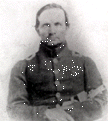
|
|

|
South Carolina C.S.A. |
|
Company G Sixteenth South Carolina and |
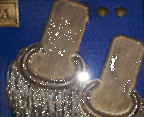
|

|
|
Photo from the family. The background for this page is Lt. Powell's Masonic Quilt Photo from family |
|
In 1836, a new republic was fighting for its life in Texas. Men like Colonel Travis, from South Carolina, were writing words to rally men to the aid of those who would die with him at places like the Alamo. Sam Houston, a Mason, was fighting Santa Anna, another Mason, for control of a vast area of Mexico, which would all too soon be Texas. The "Yellow Rose," was still a slave and not yet a legendary song or yet one of many who would help save this yet unborn nation. Confederates from A.S. Johnston, the soon to be Secretary of War of Texas, to forgotten men whose bodies have long since turned to dust at places called Shiloh, Sharpsburg, and Franklin, were on the move toward Texas, all for liberty. In the distant South Carolina Mountains, this call for assistance was heard and a young man, who was the son of veteran of the War of 1812, cut for Georgia to help the boys in Texas. He arrived after the fighting was over, but his will was such that he chose to stay and help the new Republic get a foot hold in what was then a far away land. I know little of what he came in contact with, whom he met, or how much he saw. Was it here that he became a Mason? What we do know is that for his service he was awarded 320 acres of land that he gave to someone else. He came back to the mountains of South Carolina, to my knowledge to never again see the Republic he created. Twenty years later when the invasion of the south came, he answered once again his countries call. He served in the Sixteenth South Carolina and the Reserves and again found himself in a place of leadership, rising to the rank of Captain. The children of his early marriage having grown to maturity, they served as well. Two sons in the Sixteenth and another in the valiant Fourth South Carolina, a unit so given to battle, that by the time of Sharpsburg, only two companies were left, and they were given up to an equally decimated Hampton Legion (Infantry), a unit that had served with the Texas Brigade until after Sharpsburg. The young man, now grown old had started a second family. Little could he know that with his death, after this his second war, this second family, or at least a part of it would live the dreams of the father. The youngest son and his full brother and one of the half-brothers from the Sixteenth would after war find a new home in the distant land their father knew well, Texas or bust, a new life, another chance. Nor could Edward B. Powell know that his spirit, his sense of adventure, his love of his land would live well into the twentieth century, having tamed a land and settled a nation. Here is the south, and the men of that south, there is nothing but love of the land, love of God, and pride in accomplishment to be found here. This is a salute, long past due, to Lt. Edward B. Powell, the son of patriots, lover of liberty, and fighter for the Republic of Texas and the Confederacy and his state, the sovereign State of South Carolina... and to his sons Stephen, William, Young Henry Edward, and Cal, the men who lived the "dreams of our father." The information in purple was assembled and presented by Chester A. Howell. There are men and women who assemble paper, and save information, and things, because it brings them a sense of who they are. Many of these caretakers order these things, knowing that others will, like they are, be compelled to know the answer to the age-old question, From whence come you? Chester Howell, and Terry Woodward are two of these caretakers and carriers of light. To them and those like them, we should always be thankful...for they not only cared, they carried, and they had the vision to see, so that we could know.... and that is the essence of being southern... the knowing. Waco, Texas Dear Steve, I am happy to send you a copy of the letter, which John and Barbara Boling generously gave to me. It was written by M.C. (Matthew Calvin Powell) to his cousin, L.L. (Luther Landrum Boiling) on April 8, 1885. M.C. Powell (called Cal) was the youngest of Captain Edward B. Powell's children. He had become an orphan after losing his mother when we was 7 years old and his father when he was 15. He had always been very close to his brother Y.H.E. (Young Henry Edward) Powell called Bud, who was three years older than he, they being the only sons of Edward B. Powell's second wife, Elizabeth Carter, other than an infant who lived less than a year. After Bud married on December 20, 1884, Cal probably felt that it was time for him to pursue a new life for himself in a new place in the west. So in January of 1885, he boarded the train and let for Anna, Collin County, Texas, a town that had been established just two years earlier with a population of 20. In 1883, the area that had been just a railroad stop was laid out into town lots and the first store was opened. When Cal arrived in Anna, he was only 19 years old, would not be 20, until the following July 13, Fay Burr Powell, a daughter of Cal's, who had retired in Anna after being a school teacher and principal in Roswell, New Mexico for 41 years, was interviewed by a writer for a newspaper in Mckinney, the county seat of Collin County. She said that her father told the children that when he arrived in Anna, he had three things, homesickness, measles and one extra shirt. At the time, when Cal wrote the letter to his cousin, on April 8, he had been in Anna only three months. It is shown in the letter that during the three months, Cal's half brother, James William Powell (called J.W. or William) also had moved to Texas with his wife and daughter. One of the letters on your web site (A Confederate Odyssey), was written on November 13, 1886, to L.L. Boling by W.E. Batson and stated: "J.W. Powell and family got in the 4th of this month and looks health and well they say --- Calvin did not come. He is going to school they say." In the interview with Burr Powell mentioned above, she told the reporter, "Papa finished school here under a Mr. Moore, who was a hard driver. Boy, he really made them learn. Mr. Moore was a good mathematician and really taught Papa all the fundamentals." In, A Town called Anna, a history of the town, which I compiled in 1992; it is stated that J.C. Moore taught school in a three months subscription school beginning in 1874, before the town was established. His one room school building was located where the depot would be built in 1883. In 1884, when the new town built its first school, a Mr. Moore is listed as one of the teachers. He would have been the one Burr referred to and probably the J.C. Moore previously mentioned. When William was back in South Carolina in November of 1886, he had moved his family back there, presumably not being satisfied with the situation during their short time in Texas. Four years later, in 1890, Cal was back in his home state on another visit, this time with his wife, Maud, whom he had married on December 16, 1888, and their baby daughter, Nora, born September 15, 1889. This time he must have done a real Texas brag selling job on his brothers because he returned to Anna accompanied not only by William and his family, but also Y.H.E., his wife Caroline (Carrie), their daughter, Decer and son, Sherley. Very truly yours, Chester Howell For 37 years Cal Had Kids in College By Frank X. Tolbert “During a 37 year span in my life I had at least one of my children, and usually several going to college” Matthew Calvin Powell of the city of Anna, Collin County told me one day last week. “Sure keeps you hopping when you’ve got kids going to college for 37 years,” said Mr. Powell. When I talked with him, he was, with good appetite, finishing up a luncheon of roast turkey, black eye peas, buttered biscuits, and pound cake in the kitchen of his comfortable 2-story white frame house in downtown Anna. Fortunately for a man with all those children to raise and educate, Mr. Powell has been a highly successful businessman. He was – and he says he still is – a “trading man.” “I’ve got two barns of hay I’d like to trade now,” he told me. “Not too many years ago, father was sending out 300 freight car loads of hay a season from Anna,” said his daughter, Miss Nora Powell. Besides hay and grain, he traded in livestock and land and wound up with a few oil wells. It seems incredible even for a man of 100, yet Cal Powell had two brothers who served in the Confederate Army in that 1861-65 war. “I was the last of the litter,” he phrased it. And the youngster, “was raised on Civil War stories” told by his older brother, Stephen and William, and by his father, Edward Powell, a confederate company commander. Besides being still “sharp” of mentality, Cal Powell is in pretty good health for 100 years on the globe. He gets around the house with the help of an aluminum-supporting device, which he pushes ahead of him, and he insists on almost daily auto rides. He was out even during the big snows recently. Beside Miss Nora Powell, his living children are Bill Powell, Earl Powell, Vance Powell, Miss Lotie Powell, Miss Burr Powell, M.C. Powell Jr., Mrs. Norman Kline and Mrs. Roy Turner. Anna – M.C. Powell, prominent Anna resident, will be honored at open house Sunday, July 18, at his residence there. The occasion is to celebrate his 100th birthday, with his children as hosts for the event. All relatives and friends are invited from 3 to 6 o’clock and the hosts request no gifts. Mr. Powell, a prominent pioneer, was born in Greenville South Carolina, July 13, 1865, coming to Texas at the age of 19, in January of 1885. He has been a member of the Baptist Church at Anna for 80 years where he taught a Sunday School class for 35 years; was a deacon over 60 years and a trustee for a half century. Mr. Powell gave up teaching the Sunday School class on his 85th birthday when his hearing became defective. A letter from a 19 year old Cal Powell New resident of Anna P.O., Collin, Texas, late of Greenville County, S.C. Anna, P.O. Collin County, Texas Mr. L.L. Boling My Dear Cousin It is with much pleasure that I occupy the present time in trying to write you a few lines in answer to your kind letter that I received from you a few days ago. I was indeed glad to here from you & that you was enjoying good helth but sorry to learn you had bin sick. You rote you thought I had forgoton you I had begun to think that of you. I had bin looking for a letter from you for sometime & if you had not ritten when you did I was going to write & ask you what was the matter with you: you rote that small grain was looking badly there it is not the case here it is looking verry promising here the winter is broke and the woods is getting green & the perrarie is green with grass & the droves of horses cattle & sheep grassing there on is beautiful we are done planting corn I think people is generly about done planting of corn. We have good society good water & I think the helth of the people is very good in this county from what I here it is better here than in S.C. Landrum I am well satisfied with my new home I think this rich land ought to make every man satisfied. Landrum I have bin enjoying my self splendid since I have bin in Texas except when I was sick with measles I am getting very well acquainted with people now I have bin to two candy pulings & two socials and was ask to three taredowns but did not go since I bin here & have bin to singings most every Sunday night for the last six weeks. Well Landrum I am at a loss what to write that will interest you it has bin raining but it is clear now & this Texas mud is drying up you may no that I have lurned to pull through it tell little Stephen that I think if he was out here when it rained he would be so hevey he would stick up and stay thare until it got dry also wold like to see him & have him tell some of his (kin folks?) tell Aunt patsy that I would like to see her & talk with her I often think of the last visit I paid you and how I enjoyed it. Landrum when you write to John I want you to give him my address and tel him I want him to write to me also tell your father & family to write William & family tell all to wite to him Well I must close for this time hoping to hear from you soon this leaves all well at this time ever hopeing these few lines may come safe to hand & find you all enjoying the same blessing excuse all mistakes & bad writing so good night Write soon to your affectionate cousin M.C. Powell |
|
James William, Young Henry Edward, and Matthew Calvin By: Chester A. Howell These three brothers came from Greenville, South Carolina and settled in the Anna community of Collin County, Texas in the latter part of the 19th century. The first to come was Mathew Calvin Powell (Called Cal), who as a single young man at the age of 19 came alone to the new town in January of 1885. soon after that, Calvin's half brother, James William Powell (Called William) came to Anna with his wife Elizabeth (Called Lizzie) and their daughter, Mamie. William and his family apparently became homesick for South Carolina, as they returned there after a short residency in Texas. Calvin married in December of 1888, and the first of his twelve children was born in September of the following year. In 1890, Calvin took his young family on the train to visit his family in South Carolina. Upon his return to Anna, he was accompanied by William, Lizzie and Mamie's young son Willie. Calvin was also accompanied by his brother, Young Henry Edward Powell (Called Bud), and his family consisting of Bud's wife, Frances Caroline, and their two children Decer and Sherley. During the time when William and his family were living in South Carolina after their return, Mamie had married Spartan McKinney and they had become parents of the son, Willie. Spartan Mckinney died before the family's second move to Texas, and Willie died a few years later. William, Bud and Cal were sons of Edward B. Powell, who was born in South Carolina on February 24, 1816 and died there on November 10, 1880. Edward B. was the son of Rev. Stephen Powell, who was born in Virginia on March 1, 1786 and died at Marietta, South Carolina on October 26, 1878. Stephen married Patience Bomar on October 2, 1810. Patience was born in Halifax, Virginia, on October 2, 1823. The children of Stephen and Patience were Edward B., Martha, William, and Thomas. On October 1, 1814, Stephen and Patience were living in Spartanburg, South Carolina when he enlisted in the army during the War of 1812. He served as a corporal in Captain James Brannon's Company of Artillery, a part of Major John P. Felder's and Later Major O'Harra's Battalion in the regiment of South Carolina Volunteers commanded by Colonel Means. (Section Cut) At the age of twenty, Edward B. Powell joined a company being organized in Dalonegha, Georgia and traveled to Texas to serve in the Texas Revolution. For his three months service he was granted 320 acres of land, but desiring to return to his native South Carolina, Edward B. assigned the land to another man. Edward B. Powell first married Malinda Burns on January 15, 1839. She was born on December 1, 1824 and died August 9, 1853. Their marriage occurred a month before Edward's twenty-third birthday and a month and a half after Malinda's fourteenth birthday. Before she died at the age of twenty-eight, she had three sons and three daughters. They were Stephen, October 10, 1839; Patience, November 19, 1841, (She lived less than three years); Jerimiah (Jerry), January 16, 1844; James William, July 24, 1846; Mary, January 9, 1849; and Frances, January 23, 1852. Edward B. Powell and all three of his sons became soldiers for the Confederacy during the War Between the States. Jerry died in Richmond during the same night on which his half brother, Young Henry Edward, was born. Edward B., Stephen and William enlisted in Company G, Sixteenth South Carolina Regiment. This regiment consisted of ten companies; each organized in a different area of Greenville County. Company G was organized in the Marietta community and a large number of its members were Powells, their relatives and their in-laws. Edward B. was a Second Lieutenant, Stephen was the First Sergeant and was wounded in the battle of Franklin, Tennessee. William was a private. Henry Springfield, the husband of Edward B. Powell's sister, Mary, was a fourth Corporal, and was wounded at Kennesaw. John W. Boling, the son of Edward B. Powell’s sister, Martha, was a First Lieutenant when Co. G was formed and later became its captain. (Boling acted as the regimental commander from after the Battle of Jonesboro until after Nashville.) H. Young Batson, husband of Martha’s daughter, Mary Jane, was a member of Company G and was killed in the Battle of Franklin. On April 28, 1862, the Sixteenth Regiment entered Confederate States service from South Carolina service and was reorganized. Like the reorganization of the Army of Northern Virginia, older officers were asked to leave the field to younger men. Edward B. Powell resigned on that date. On November 14, 1862, three and a half months after the birth of his son, Y.H.E., he enlisted in Company G, Third Regiment, First South Carolina reserves as a Second Lieutenant. He later became the company commander of Company H, in November of 1863, having been promoted to First Lieutenant on September 12, 1863. Eight months after his wife, Malinda, died, Edward B Powell married Elizabeth Carter in April, 1854. To them were born four children: Thomas, August 24, 1856; Rowena, May 20, 1858; Young Henry Edward, July 27, 1862; and Matthew Calvin, July 13, 1865. Elizabeth Carter was born August 18, 1827 and died May 7, 1873. She was the daughter of Mathew Carter and Catharine Borin. Mathew Carter was born in 1786 and lived until 1885. He was the son of Jesse Carter, who was a private in 1778 in the Fourth Regiment of Artillery, South Carolina Troops. |
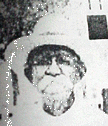 James William Powell Private, Sixteenth South Carolina By: Chester Howell James William Powell was born in Greenville County, South Carolina, on July 24, 1846, the youngest of three sons of Captain Edward B. Powell and his first wife Malinda Burns. The other sons were Stephen, born October 10,1839; and Jeremiah (Jerry), born January 16, 1844. When soldiers were recruited for Co. G, 16th South Carolina Infantry Regiment, late in 1861, Edward B. Powell and two of his sons, Stephen and William enlisted in this unit. Records from the National Archives show that Jeremiah Powell enlisted September 1, 1861 at Germantown Virginia, in Company G, Fourth Regiment, South Carolina Volunteers. Company G of the Fourth was from Greenville County and was known as the Saludia Guards. The unit was commanded by Captain J.G.Hawthorne. He (Jeremiah) would die near Richmond on the same night that his half brother, Y.H.E., was born, July 27, 1862. (Note: Kirkland in Broken Fortunes lists the following: J.A. Powell, Private, Company C, Orr’s Rifles, Died 06/27/62, Killed in Action, Gaines Mill, Virginia) William Powell’s time with the Sixteenth South Carolina was one year. This fact is obtained from the file of the Civil War Pension Application of Samuel C. Morgan. Morgan applied July 20, 1908. He was 67 years old and had resided in Anna, Collin County, Texas 27 years. He stated that he served in Company H, 16th South Carolina Infantry, from October, 1861, to Spring of 1865. The file contained a letter from the War Department stating S.C. Morgan, Sergeant, Company H, Sixteenth South Carolina, enlisted November 26, 1861, was reported sick on last muster roll on file, dated August 31, 1864. Two people who wrote in testimony of Morgan’s military service were Herbert H. Garmany and J.W. (William Powell). Garmany stated he had known applicant for 45 years or more, that he knew him in Greenville County, South Carolina, and that they both served in Company H, 16th South Carolina, Evans' Brigade. (Note: The Sixteenth was never a part of the unit known as the Evan’s Brigade but it was under his command on the coast of South Carolina, prior to the organization of Gist’s Brigade.) Garmany’s name does not appear in the Roll of Companies in the John S. Taylor, 1964, book on the 16th South Carolina. H.H. Garmany served in Company E, Sixteenth S.C. until November of 1862, He was omitted from the memory rolls, from which Taylor drew heavily. Samuel W. Morgan and three other Morgan's are listed in H Company, it is likely that this is the man referred too and the W is a copy error.) J.W. (William) Powell, age 62 years, of Anna, Texas, stated that he first knew the applicant in March of 1861 in Greenville. They served together one year, after which Powell was discharged and joined Hampton’s Legion, Captain Hall’s Corps. The applicant had been bedfast for a year and unable to support himself. Captain Hall's Company of the Hampton Legion was Company I, which was one of two companies that traced its origins to the Fourth South Carolina Battalion. The Fourth South Carolina Battalion was formed when the Fourth South Carolina Regiment failed to generate enough men to form a regiment during the June 1862, reorganization. The Fourth Battalion served in Jenkins Brigade and the two companies left after Sharpsburg were consolidated to reconstitute the Hampton Legion. Captain D.L. Hall being the commanding officer of the new Company I, Hampton Legion. Thus William served with the men who had served with his brother, Jeremiah, who had died in 1862. As a note of interest, the flag of the Fourth South Carolina is one of the few regimental colors that survive in private hands. A descendant of the man who brought it home, probably after Sharpsburg, still holds it for the men who served it so well. On August 13, 1909, Amanda P. Morgan, widow of Samuel C. Morgan, who died June 3, 1909, made application for a widow’s pension. She was 67 years old, born in Greenville County, South Carolina. She stated that her husband served in Company H, Sixteenth Regiment, SC Infantry 3 ½ years. After coming to Anna, Morgan bought out one partner in the first store built in the town, later with his son, W.M. Morgan buying out the other partner. William Powell married while he was in the army, on January 7, 1864, Elizabeth (Lizzie Robinson, 1842-1933). They had one child Mamie who married Spartan McKinney and after his death, Schuyler Pool. William died November 18, 1930 and is buried at Highland Cemetery, near Anna, Texas. After making his second move to Anna, Texas in 1890, William, with a partner, opened the third store in the town, Powell and Copeland General Merchandise. He also farmed. A Long Winter's Night Thank You Mr. Howell I have this story about Uncle William during the war that my grandfather told me. William had told him that during one winter night, he was lying on the ground trying to sleep and he was so cold that he though he would freeze to death during the night. The next thing he knew, he was nice and warm and believed he was in heaven, that being the only explanation for his feeling so good. As he woke up more, he knew he was still alive but he had trouble getting up because of the weight on his body. As he slowly got into a sitting position, he discovered that a big snow during the night had covered his body several inches under the snow. It had become an insulator so that his body heat was able to warm him so that he was sleeping comfortably. |
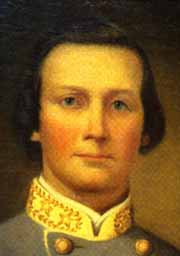
|
|
|
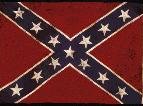
|